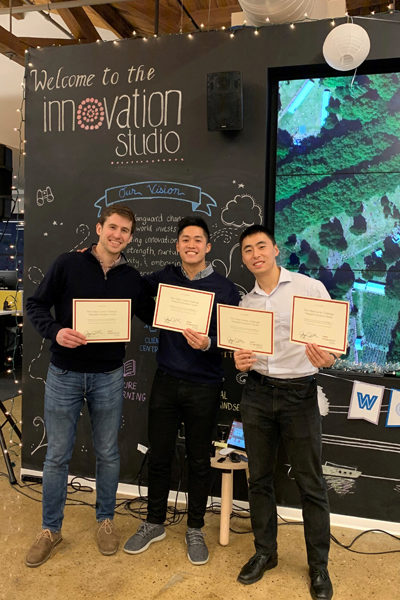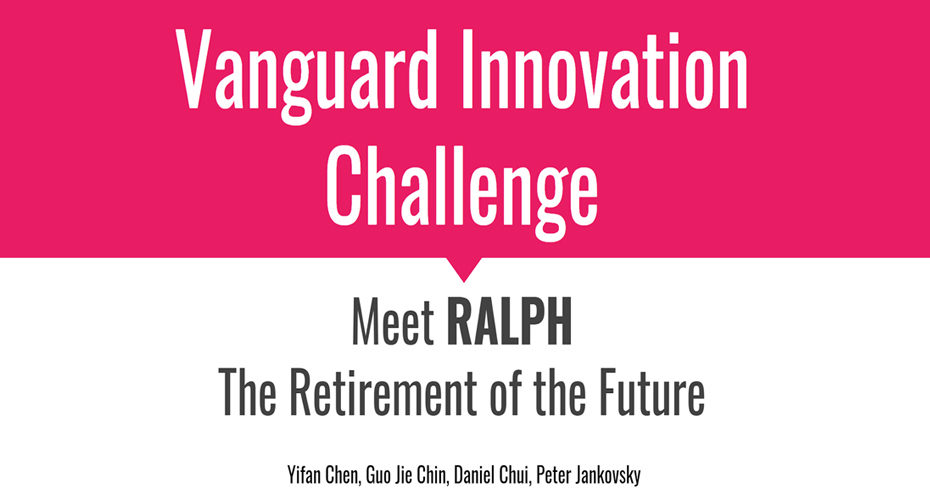
The Vanguard Innovation Challenge, hosted by the Mack Institute in collaboration with Vanguard Innovation Studio, asked Penn students to find solutions to some of the most pressing questions facing financial services today. Digital disruption is poised to transform the industry, and fintech is becoming an increasingly popular field for students who want to do the disrupting themselves.
Of the 14 teams who entered, the winning team responded to the prompt to serve the retirement and investment needs of non-traditional employees (NTEs). Their solution, Ralph, is designed to be a friendly, intuitive retirement planning tool. The team members describe their experience:
We decided to participate in the Vanguard Innovation Challenge because each of us has a background in financial services and felt eager to explore how the latest technologies could impact the industry. The prompts for the challenge also spoke to us as they covered the most pertinent issues facing the space today.
The five prompts were as follows:
- Retirement of the Future
- Future of Cash Management
- Client Experience
- Underserved Markets
- Family Wealth Dynamics
The prompt we selected challenged us to serve the retirement and investment needs of non-traditional employees (NTEs). NTEs are a diverse group encompassing many life and employment situations: entrepreneurs, freelancers, contract employees, employees at smaller companies that don’t offer retirement plans, etc. There is a growing need for new products to serve the NTE community. To start, NTEs are growing three times faster than the U.S. workforce as a whole, with 40% of these workers earning six-figure incomes, yet only 16% of NTEs have assets in employer-sponsored retirement funds. Millennials seem to be an obvious choice as a target segment, as 47% of them have experience as NTEs.
We called our solution Ralph. It functioned as an automated financial planner for NTEs that empowered them to continue to work the way they wanted to work. Ralph would provide customers with honest paystubs that provide financial clarity by summarizing all the sources of income and the necessary deductions, including estimated tax payments, to get to a clear take-home income number. Ralph would also provide automated investing, allowing NTEs to plan and invest for the future.
We knew that our solution would have to be extremely user-friendly, especially if we hoped to draw in a millennial audience. We thus drew ideas from social media and e-commerce to lower the friction and truly engage customers, and we designed techniques like gamification to coach them in financially prudent behaviors.

We also wanted to make sure that our product was implementable, and thus drafted the most practical product roadmap. We began by imagining what a minimum viable product would look like and how it would address the most critical needs of NTEs. We then conceptualized a mature product that could better serve more sophisticated NTEs. Finally, we imagined what Ralph could look like in a future state, and how the luxury of time and resources could make the experience seamless for all NTEs.
As a final step, we researched the financial potential of such a product for a company like Vanguard. We believe Ralph would have multiple sources of revenue generation and create a new funnel to Vanguard’s existing asset management products. What we like best about our solution is that it capitalizes on major demographic and workplace trends in a way that leverages existing products like index funds to ensure that anyone can plan for retirement.
Why Fintech?
Each of us has our own unique reason that we’re drawn to fintech:
- Yifan has worked both as a consultant in the financial services space as well as a software engineer. He is interested in the technical side of fintech and how innovation in big data, artificial intelligence, and telecommunications can be harnessed to evolve fintech to serve the needs of people on a global scale.
- Guo Jie’s academic interests have always been at the intersection of technology and finance. Working at a hedge fund after college, he became interested in how new technologies could widen access to financial services. In his most recent full-time role, he joined Square Inc. to apply his experience in finance towards the goal of making payments simpler for small and medium-sized businesses.
- Daniel’s background in finance coupled with his upbringing in the Bay Area sparked his interest in fintech’s potential. Over the summer at LinkedIn, he analyzed M&A opportunities in the Future of Work and was particularly struck by how underserved NTEs are and how fintech is rising to serve the changing needs of employers and workers.
- Peter first studied finance as part of his economics major in college, and quickly made financial services his focus area when he became a consultant. As he learned more about the space, he became excited about the potential of technology to provide more consumers with affordable and simple financial products, an interest he is now further exploring via the Wharton FinTech Club.



